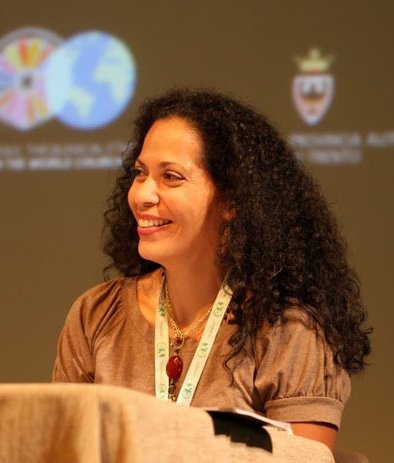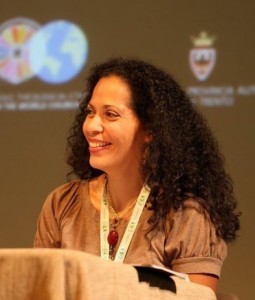Asking the right question – MT Dávila
Have you ever been asked sincere, deep, sometimes maybe even strange questions about your life of faith or your discipleship? A common question in certain circles is whether you have accepted Jesus Christ as your Lord and Savior. I find it odd that I have NOT been asked that question before. Another common question, especially from academics studying the religious practices of Christians in the U.S., is whether you attend a church every week (or once a month, or once a year – please check one!). Another question reported on recently is whether you will choose/have chosen to raise your child in a particular community of faith, and why. Ethicists and theologians who take seriously the intersection of lived faith and deep reflection are fascinated by such questions. We rely on them to help us better understand the role of religious leaders, the links between religion and civil society, what ethical norms guide people’s engagement with politics and power.
Sometimes, asking so many questions of members of communities of faith may seem disingenuous, a cop out for academics who cannot come up with anything intelligent to say about the church without having some “data” to back it up. And yet, as I begin preparing myself to engage in some ethnographic work – devising the questionnaires and the interviews with which I hope to engage different communities on their concept of discipleship and activism – I am reminded of how important it is to ask questions, to try to be in touch and informed about the daily living, lo cotidiano, of different groups who define themselves as followers of Christ. I am unable to reflect honestly and deeply on particular ethical questions regarding Christian living unless I am in conversation with myself as a Christian, my family, and other people of faith, from various backgrounds, traditions, ethnic groups, genders, and generations. In the asking we can come to find out that the religious practices of our institutions do not provide comfort or are irrelevant for women, or immigrants, or lower income families. Through ethnographic research we may come to find out that the most significant dimensions of a group’s life of faith takes place outside of worship, in homes, jobs, or schools where the messiness of living one’s faith is challenged or tested.
Perhaps more importantly than asking questions, passing out surveys, and taking interviews, is the process of entering into long-term relationships with others. While we may come to this kind of research with our own particular questions, honest and mutual conversations with communities of faith reveal practices and beliefs, as well as revealing the questions that actually matter to them. What does it mean to engage discipleship and politics in this country as first generation Christian immigrants? How do we come to pass on to the next generation a religious tradition that is as much a cultural phenomenon as it is a basic doctrine? How do we incorporate women’s concerns into a male dominated church structure? As a scholar I come to the ‘asking’ stage of my research and scholarship with a humble and open mind, understanding that my initial questions and research design may in fact be masking what is most important to the communities I claim to care about and speak for. In this mutual engagement, relationship building, and shared worship I have to leave room for the real questions to surface, and be answered in an environment of trust and mutuality. Some have coined this type of research “Participatory Action Research” or P.A.R., and it is grounded on the possibility that relevant and meaningful research can only develop in a relationship of mutuality between researchers and community, where all parts take on and offer up some measure of vulnerability, humility, honesty, and commitment to the flourishing of the other.
There is a deep part of my scholarly identity, classically trained, that wishes that questionnaires and surveys were a straightforward process of gathering information, to then submit to a data processing program (these days more commonly found in websites and apps). Then I would draw whatever conclusion became evident from the results, or, worse yet, impose my own conclusions on the results, regardless of what the data showed (not an uncommon phenomenon, unfortunately), and sit back to await hard-earned accolades for my work. And yet, I am aware that if I truly want to get at people’s understanding of discipleship and activism – the particular theme I want to explore – I will need to enter into relationships of mutuality and trust where the terms of the research will be defined in community, the questions will arise as we pray together and understand what motivates our discipleship and our hopes and dreams for the human family, both locally and globally, and the answers will depend on humble openness to the daily lives of the people with whom I engage.
This is particularly scary because it makes for very vulnerable and fluid research. How does one write grant proposals and protocols for the use of human subjects (commonly known as IRB guidelines) when even the very questions and data collection methods of the research will be designed in the process of relationship building? It takes a forward thinking institution to understand that some communities of faith will be comfortable with small group conversations, while others will prefer one-on-one interviews, while others will want you to worship with them before asking any questions, still others might prefer paper-and-pencil surveys, and perhaps all will desire a combination of these. And yet, if scholars of religion, particularly ethicists and theologians grounded in womanist, feminist, Latino/a, and other liberative frameworks, wish to speak in relevant ways about the Christian faith today – and the ways we hope that it will open life-giving avenues for the human family – these are the important conversations that need to take place. They are the imaginative spaces where both community and scholar will come to a surprising place of knowledge, empowerment, and action, driven by the openness to real lived experiences and the Spirit’s guiding light.
The risk that this approach presents is that there may not be a book or publishable essay at the end of this academic tunnel. Indeed, there may only be the joining of my own spirit of learning and discipleship to the particular struggles that may surface in the community or communities with whom I engage. But I am confirmed in the knowledge that, if I risk asking the questions authentically and in mutuality, then this is the liberative path to take. My hope is that in time the academy and its institutions will fully understand the validity of liberative research grounded in relationships of mutuality, vulnerability, and care between scholar and community. Authentic theological reflection crucial for the health of the human family depends on this.
MT Dávila, a Roman Catholic laywoman, teaches Christian ethics at Andover Newton Theological School. She has published in the areas of immigration and race, the option for the poor and public theology, and the role of the social sciences in ethical reflection. Her central interest is the role of Christian discipleship, activism, and the public square.


